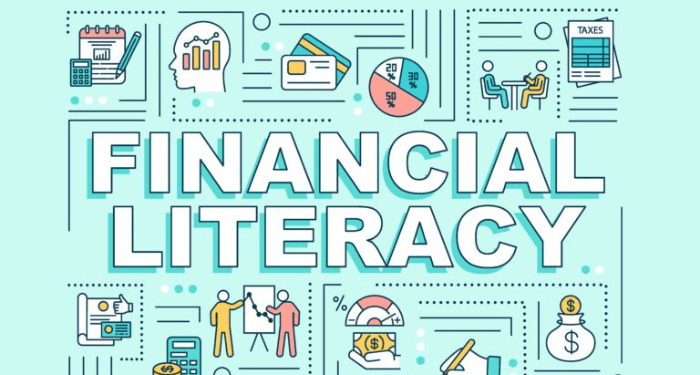South Africa’s economic development problems usually make headlines through discussions about joblessness and inadequate infrastructure along with unstable policies. The economic development of South Africa relies on its population’s financial literacy which remains a critical yet unnoticed factor.
A Human Sciences Research Council study shows that South African financial literacy stands at 51% which matches developed economies yet fails to meet expectations for an emerging market needing accelerated development. The economic implications of this figure extend throughout the entire economy yet most policymakers fail to recognize its full impact.
The ‘Macroeconomic’ Case for Financial Literacy
National economic performance strongly depends on individual financial knowledge although most people do not recognize this connection. American economist Frederic Mishkin made this connection explicit at the National Summit on Economic and Financial Literacy when he stated: “The choices we make as individuals, as consumers and investors, are linked to the broader economy in ways that we don’t always appreciate. However, one thing is certain. The economy achieves better results when people make informed choices.
This connection affects South Africa’s economic development through different pathways which produce cumulative effects:
Capital Allocation Efficiency
Higher financial literacy among the population results in better savings distribution patterns according to Journal of Financial Economics research. Capital moves more efficiently into productive investments when people understand financial products and risk and return principles thus avoiding idleness and misdirection.
South Africa faces a major inefficiency in its capital distribution system. According to the Financial Sector Conduct Authority’s assessment R12 billion each year enters informal savings systems that create no economic value but formal financial channels could support business development and job generation.
Market Depth and Liquidity
The level of participation in stock markets functions as a significant economic force which depends on financial literacy knowledge. Stock ownership in South Africa stands at 3.5% whereas American and British citizens hold shares at 55% and 33% respectively. Market participants who do not engage in stock ownership create two major economic consequences: market price discovery becomes less efficient and capital costs rise which hinders business expansion in South Africa.
Dr. Monique Nsanzabaganwa who serves as Deputy Governor of the South African Reserve Bank explains: “Financial illiteracy creates limited capital market depth in our country.” The absence of ordinary citizens in equity markets results in inefficient price discovery alongside increased volatility which leads to higher capital costs that obstruct business expansion according to Dr. Monique Nsanzabaganwa.
Financial Stability and Resilience
Financial literacy functions as a stabilizing force across international borders. Countries with better financial education maintain stable financial systems because they avoid credit bubbles and default events. Financial knowledge in consumers leads to better borrowing habits and stronger resistance against economic disturbances.
The COVID-19 pandemic functioned as a natural test of this situation. The recently completed Wonga research (wonga.co.za) demonstrated that households with better financial literacy maintained 37% lower default rates on financial obligations when facing economic challenges which results in more stable customer relationships for financial institutions.
The Hidden Economic Costs of Financial Illiteracy
Financial illiteracy generates substantial growth barriers which reduce South Africa’s economic development potential:
The Debt Servicing Burden
The South African Reserve Bank reported that household debt as a percentage of disposable income exceeded 62.4% during 2023. A household must dedicate R62.40 out of their R100 after-tax earnings to debt repayment. The massive diversion of purchasing power reduces both consumption and productive investment levels which causes direct harm to economic growth.
Better financial decisions by consumers would reduce the debt-to-income ratio by five percentage points annually according to the South African National Treasury (treasury.gov.za) resulting in R87 billion that could be used for both consumption and investment.
Financial Stress Causes Organizations to Waste Productivity
Financial stress produces output reduction that economic models do not measure but severely affects production levels. Financial stress causes employees to miss 13 productive workdays per year as shown by World Economic Forum research (weforum.org) through absent workdays and working while unwell and using more healthcare services.
The productivity loss from South Africa’s workforce of 16 million workers would amount to more than 200 million lost days annually since it would equal the absence of 800,000 full-time employees in the economy.
The Innovation Gap
Financial illiteracy produces the most severe threat to long-term economic development because it results in an innovation deficiency. When citizens lack financial confidence they show less willingness to take risks in entrepreneurship. South African job creation through small businesses faces direct economic consequences because of the risk-averse behaviour of citizens.
According to a Human Sciences Research Council study from 2023 business founders who showed higher financial literacy scores had a 58% higher probability of starting their own ventures. Financially less-literate entrepreneurs’ business survival rates dropped by 23% during the first two years of operation compared to ventures started by more financially literate entrepreneurs.
Provincial Differences in Financial Literacy Levels Together with Their Related Economic Effects
Financial literacy levels throughout South African provinces demonstrate significant geographic variations which directly relate to economic growth levels. FinMark Trust conducted extensive mapping that demonstrates financial literacy exceeds 60% in Gauteng and Western Cape yet Eastern Cape and Limpopo maintain rates below 40%.
The existing differences between economic areas act both as signs of unequal development and as factors that sustain economic differences between regions. Provinces with lower financial literacy typically experience:
- Higher informal lending rates with predatory interest charges
- Lower formal financial services penetration
- Reduced entrepreneurship rates and business formation
- Higher household debt-to-income ratios
The economic gap between central and peripheral regions of South Africa continues to grow because of these negative feedback processes which obstruct balanced national growth.
Policy Directions for Moving Forward
The recognition of financial literacy as a macroeconomic lever points toward multiple policy choices.
- Curriculum Integration Beyond Pilot Programs
Financial education should become mandatory throughout the entire nation because school pilot programs have shown success in introducing the subject. Countries that made financial education mandatory such as Singapore and Estonia demonstrate improved national financial capability results across one generation.
- Workplace Financial Wellness as Economic Strategy
Employers maintain an underdeveloped platform which they could utilize for teaching financial education to adults. Employer-provided financial wellness programs with tax benefits would enable mass delivery of services to the working-age population leading to immediate productivity improvements.
- Fintech-Enabled Mass Education
South Africa’s high mobile penetration presents an exclusive chance to use digital channels for delivering financial education across large populations. The establishment of regulatory sandboxes for innovation in this field will help develop powerful digital learning resources.
- Financial Literacy as Credit Risk Factor
When financial literacy becomes a factor in credit scoring systems it establishes direct rewards for customers who boost their financial knowledge while opening credit opportunities for individuals with demonstrated capability beyond conventional credit records.
Beyond Individual Benefits: A National Economic Imperative
The exclusive focus on personal advantages of financial literacy fails to recognize its comprehensive economic value. Economist Annamaria Lusardi’s research proves that millions of financially well-informed decisions by the population generate macroeconomic effects which surpass individual advantages.
The Bureau for Economic Research (ber.ac.za) predicts that increasing South African financial literacy to 70% from its current 51% would boost GDP growth between 0.4 and 0.6 percentage points annually thus speeding up economic expansion below 2%.
This growth dividend comes through multiple channels: more efficient capital allocation, greater market participation, reduced financial stress, increased productivity, and more resilient household balance sheets.
Financial literacy stands as a fundamental economic driver which when properly engaged will boost national growth rates and establish stronger and fairer economic prosperity.
Policymakers should consider implementing financial capability programs for citizens because such initiatives provide superior cost effectiveness to address South Africa’s economic obstacles. The economic acceleration that South Africa needs can be achieved more effectively by enhancing the financial literacy of its citizens instead of following conventional macroeconomic approaches.










